By David Pan · Monday, March 18, 2019 Telos 186 (Spring 2019) is now available for purchase in our store. Individual subscriptions to Telos are also available in both print and online formats.
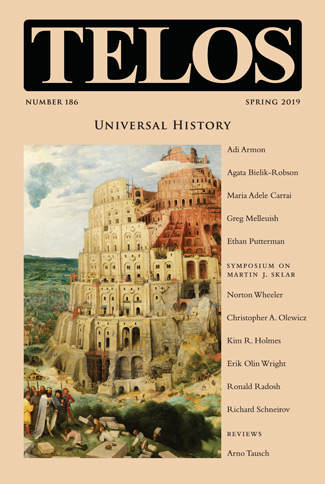 This issue is devoted to the question of universal history and is based in part on a 2015 Telos-Paul Piccone Institute conference organized by Greg Melleuish. As this event suggested, universal history today imagines the convergence of humanity around a single trajectory of capitalist technological progress coupled with the defense of liberal rights. But as much as technology has increasingly linked the world into a single movement of history, we cannot say the same about liberal rights. Rather than pointing us toward the liberal light at the end of the historical tunnel, world politics seems to be casting us into the blazing arena of the “clash of civilizations” presaged by Samuel Huntington, with different regions of the world—Africa, America, Asia, Europe, the Muslim world—increasingly at odds, each region with a dominant civilization pursuing its own cultural and political hegemony. This divergence between a materialist unity of development and a cultural fragmentation frames the problem of universal history. This issue is devoted to the question of universal history and is based in part on a 2015 Telos-Paul Piccone Institute conference organized by Greg Melleuish. As this event suggested, universal history today imagines the convergence of humanity around a single trajectory of capitalist technological progress coupled with the defense of liberal rights. But as much as technology has increasingly linked the world into a single movement of history, we cannot say the same about liberal rights. Rather than pointing us toward the liberal light at the end of the historical tunnel, world politics seems to be casting us into the blazing arena of the “clash of civilizations” presaged by Samuel Huntington, with different regions of the world—Africa, America, Asia, Europe, the Muslim world—increasingly at odds, each region with a dominant civilization pursuing its own cultural and political hegemony. This divergence between a materialist unity of development and a cultural fragmentation frames the problem of universal history.
Continue reading →
By Haerin Shin · Monday, September 24, 2018 Telos 184 (Fall 2018), a special issue on Korea, edited by Haerin Shin, is now available for purchase in our store.
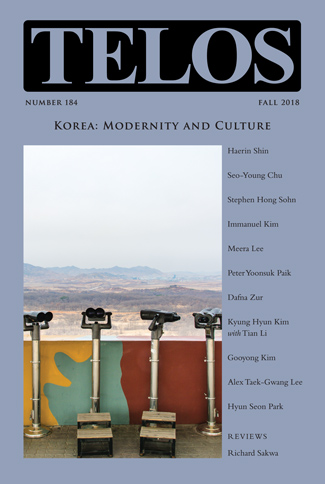 While Korea’s history as a modern nation-state has always been a tumultuous reel of socio-political unrest, never has it drawn the globe’s attention to the degree and extent to which the press coverage of the past two years attests. South Korea’s candlelight demonstrations in the fall of 2016 were widely regarded as a newly arisen form of celebratory civil protest culture, and news of the progressive party’s subsequent rise to power stood out amid the global turn toward conservative politics. Meanwhile, with North Korea’s nuclear threat becoming a palpable reality, media outlets began clamoring with predictions of a major military outbreak across the Pacific. (I remember being inundated by concerned emails from acquaintances abroad during my breaks in South Korea last year.) Then came the dramatic shift toward prospects of denuclearization and North–South collaboration this past summer. Millions watched in awe as Kim Jong Un took President Moon’s hand and walked over the Military Demarcation Line. The meeting in Singapore was viewed with skepticism in the United States, but more pertinently such attempts to reestablish channels of communication were greeted warmly in South Korea. While Korea’s history as a modern nation-state has always been a tumultuous reel of socio-political unrest, never has it drawn the globe’s attention to the degree and extent to which the press coverage of the past two years attests. South Korea’s candlelight demonstrations in the fall of 2016 were widely regarded as a newly arisen form of celebratory civil protest culture, and news of the progressive party’s subsequent rise to power stood out amid the global turn toward conservative politics. Meanwhile, with North Korea’s nuclear threat becoming a palpable reality, media outlets began clamoring with predictions of a major military outbreak across the Pacific. (I remember being inundated by concerned emails from acquaintances abroad during my breaks in South Korea last year.) Then came the dramatic shift toward prospects of denuclearization and North–South collaboration this past summer. Millions watched in awe as Kim Jong Un took President Moon’s hand and walked over the Military Demarcation Line. The meeting in Singapore was viewed with skepticism in the United States, but more pertinently such attempts to reestablish channels of communication were greeted warmly in South Korea.
Continue reading →
By Russell A. Berman · Monday, June 11, 2018 Telos 183 (Summer 2018), celebrating the fiftieth anniversary of the journal Telos, is now available for purchase in our store.
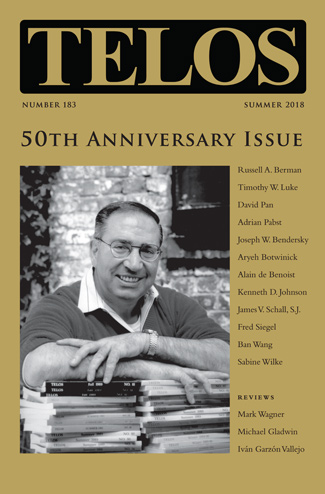 Telos began this anniversary year with our previous issue’s exploration of the legacy of Martin Luther King, Jr., tragically assassinated fifty years ago in April. That too was 1968, the excitement of profound social change and the bitter taste of disappointment. So much in our culture today remains framed by that specific polarity. Now, in this issue of the journal, we take stock more broadly: not a judgment on that one year but a return to some of the key themes that have defined Telos. We have been able to carry on these discussions thanks to the vision of the founder, Paul Piccone, the support of our publisher, Mary Piccone, the dedication of our editorial group, the intellectual agility of our authors, and the loyalty of our readers. Thanks to all. Telos began this anniversary year with our previous issue’s exploration of the legacy of Martin Luther King, Jr., tragically assassinated fifty years ago in April. That too was 1968, the excitement of profound social change and the bitter taste of disappointment. So much in our culture today remains framed by that specific polarity. Now, in this issue of the journal, we take stock more broadly: not a judgment on that one year but a return to some of the key themes that have defined Telos. We have been able to carry on these discussions thanks to the vision of the founder, Paul Piccone, the support of our publisher, Mary Piccone, the dedication of our editorial group, the intellectual agility of our authors, and the loyalty of our readers. Thanks to all.
Continue reading →
By Kenneth D. Johnson · Monday, March 19, 2018 Telos 182 (Spring 2018), a special issue commemorating the life and thought of Martin Luther King, Jr., is now available for purchase in our store.
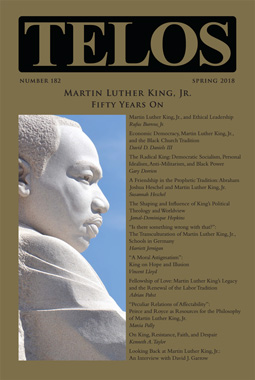 1968 was a tough year for the United States and for many around the world. The Tet Offensive in Vietnam started in January, and the My Lai massacre occurred there in March. In Paris, the student uprising started in May. The Prague Spring, during which Czechoslovakian activists sought a measure of greater freedom for their country from the Soviet Union, was crushed by Warsaw Pact military forces in August. Police rioted at the Democratic National Convention in Chicago in August, beating student protestors indiscriminately in the streets. The Weather Underground emerged in October, and black American sprinters Tommie Smith and John Carlos gave their gloved Black Power salute as a protest during the Mexico City Olympics that same month. Richard M. Nixon was elected as president in November. And, there were two pivotal deaths: Robert F. Kennedy in June, and Reverend King in April. After King’s assassination, many U.S. cities erupted in flames as their African American residents protested his killing and the moribund state of civil rights progress at the time of King’s death. 1968 was a tough year for the United States and for many around the world. The Tet Offensive in Vietnam started in January, and the My Lai massacre occurred there in March. In Paris, the student uprising started in May. The Prague Spring, during which Czechoslovakian activists sought a measure of greater freedom for their country from the Soviet Union, was crushed by Warsaw Pact military forces in August. Police rioted at the Democratic National Convention in Chicago in August, beating student protestors indiscriminately in the streets. The Weather Underground emerged in October, and black American sprinters Tommie Smith and John Carlos gave their gloved Black Power salute as a protest during the Mexico City Olympics that same month. Richard M. Nixon was elected as president in November. And, there were two pivotal deaths: Robert F. Kennedy in June, and Reverend King in April. After King’s assassination, many U.S. cities erupted in flames as their African American residents protested his killing and the moribund state of civil rights progress at the time of King’s death.
Continue reading →
By Russell A. Berman · Wednesday, December 13, 2017 Telos 181 (Winter 2017): War and Civil War is now available for purchase in our store.
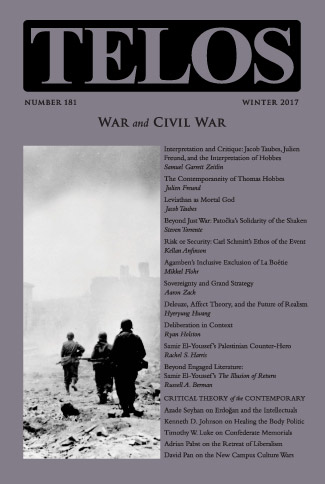 Consider the question: has American political life ever been as polarized as it is today? If the most appropriate answer is: yes, of course, in 1861, then the problem has been named and we are left with little comfort. The evaporation of anything like a bipartisan consensus in the political class leaves us staring at a battlefield, with few common bonds or shared attachments. Politics has become the internalization of war by other means. This is our version of the crisis of parliamentary democracy that Schmitt described in the Weimar years. Congressional Democrats are unwilling to cross the aisle to find room for compromise in the Trump era, but this only repeats the animosity among Republicans toward the Obama agenda eight years ago. Each party seeks its own advantage, which exclusively means the other party’s disadvantage, as the national good slips beneath the horizon. Each party focuses on mobilizing its base for votes and fund-raising, which means that each has an irresistible incentive to avoid solving those problems that are the most effective vehicles for rallying their supporters: when they held the majority, the Democrats preferred to keep the “dreamers” vulnerable, so as to be able to recycle them in future campaigns, just as the Republicans chose to punt on health care. Each issue is too successful in attracting voters, too valuable to give up. Consider the question: has American political life ever been as polarized as it is today? If the most appropriate answer is: yes, of course, in 1861, then the problem has been named and we are left with little comfort. The evaporation of anything like a bipartisan consensus in the political class leaves us staring at a battlefield, with few common bonds or shared attachments. Politics has become the internalization of war by other means. This is our version of the crisis of parliamentary democracy that Schmitt described in the Weimar years. Congressional Democrats are unwilling to cross the aisle to find room for compromise in the Trump era, but this only repeats the animosity among Republicans toward the Obama agenda eight years ago. Each party seeks its own advantage, which exclusively means the other party’s disadvantage, as the national good slips beneath the horizon. Each party focuses on mobilizing its base for votes and fund-raising, which means that each has an irresistible incentive to avoid solving those problems that are the most effective vehicles for rallying their supporters: when they held the majority, the Democrats preferred to keep the “dreamers” vulnerable, so as to be able to recycle them in future campaigns, just as the Republicans chose to punt on health care. Each issue is too successful in attracting voters, too valuable to give up.
Continue reading →
By Ning Wang · Wednesday, September 13, 2017 Telos 180 (Fall 2017) is now available for purchase in our store.
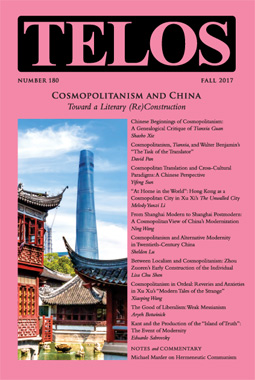 In Western as well as international academia today, along with the acceleration of globalization more generally, humanities scholars have constructed a sort of theoretical discourse of globalization. In doing so, they have found it useful to refer to the old-fashioned philosophical concept of cosmopolitanism, which is very close to the theoretical construction of the discourse of globalization. Although it has previously been discussed over the history of Western philosophy, cosmopolitanism is once again a cutting-edge theoretical topic. The term nowadays frequently appears in the works of political philosophers and sociologists, and it is increasingly being taken up and debated by literary and cultural studies scholars as well, particularly with regard to the rise of world literature as the highest phase of comparative literature. Obviously, most of their work interprets and deals with cosmopolitanism from the perspectives of political philosophy and culture, while touching to some degree upon literary and cultural production and criticism. Moreover, most of the scholarship dealing with cosmopolitanism only occurs within a Western context. In this respect, the present special issue of Telos may well fill a gap in international cosmopolitanism scholarship. The recent interest in world literature in the field of comparative literature is undoubtedly associated with the rise of cosmopolitanism in the contemporary era. In the articles collected here, cosmopolitanism will mainly be addressed from literary and cultural perspectives, and, more importantly, they will move beyond the limits of Eurocentric or West-centric ways of thinking and modes of research by dealing exclusively with cosmopolitanism and China: its parallel relations with ancient Chinese philosophy, its impact on modern Chinese literature and intellectual thought, and its recent significance to China’s modernization and globalization. In Western as well as international academia today, along with the acceleration of globalization more generally, humanities scholars have constructed a sort of theoretical discourse of globalization. In doing so, they have found it useful to refer to the old-fashioned philosophical concept of cosmopolitanism, which is very close to the theoretical construction of the discourse of globalization. Although it has previously been discussed over the history of Western philosophy, cosmopolitanism is once again a cutting-edge theoretical topic. The term nowadays frequently appears in the works of political philosophers and sociologists, and it is increasingly being taken up and debated by literary and cultural studies scholars as well, particularly with regard to the rise of world literature as the highest phase of comparative literature. Obviously, most of their work interprets and deals with cosmopolitanism from the perspectives of political philosophy and culture, while touching to some degree upon literary and cultural production and criticism. Moreover, most of the scholarship dealing with cosmopolitanism only occurs within a Western context. In this respect, the present special issue of Telos may well fill a gap in international cosmopolitanism scholarship. The recent interest in world literature in the field of comparative literature is undoubtedly associated with the rise of cosmopolitanism in the contemporary era. In the articles collected here, cosmopolitanism will mainly be addressed from literary and cultural perspectives, and, more importantly, they will move beyond the limits of Eurocentric or West-centric ways of thinking and modes of research by dealing exclusively with cosmopolitanism and China: its parallel relations with ancient Chinese philosophy, its impact on modern Chinese literature and intellectual thought, and its recent significance to China’s modernization and globalization.
Continue reading →
|
|
 This issue is devoted to the question of universal history and is based in part on a 2015 Telos-Paul Piccone Institute conference organized by Greg Melleuish. As this event suggested, universal history today imagines the convergence of humanity around a single trajectory of capitalist technological progress coupled with the defense of liberal rights. But as much as technology has increasingly linked the world into a single movement of history, we cannot say the same about liberal rights. Rather than pointing us toward the liberal light at the end of the historical tunnel, world politics seems to be casting us into the blazing arena of the “clash of civilizations” presaged by Samuel Huntington, with different regions of the world—Africa, America, Asia, Europe, the Muslim world—increasingly at odds, each region with a dominant civilization pursuing its own cultural and political hegemony. This divergence between a materialist unity of development and a cultural fragmentation frames the problem of universal history.
This issue is devoted to the question of universal history and is based in part on a 2015 Telos-Paul Piccone Institute conference organized by Greg Melleuish. As this event suggested, universal history today imagines the convergence of humanity around a single trajectory of capitalist technological progress coupled with the defense of liberal rights. But as much as technology has increasingly linked the world into a single movement of history, we cannot say the same about liberal rights. Rather than pointing us toward the liberal light at the end of the historical tunnel, world politics seems to be casting us into the blazing arena of the “clash of civilizations” presaged by Samuel Huntington, with different regions of the world—Africa, America, Asia, Europe, the Muslim world—increasingly at odds, each region with a dominant civilization pursuing its own cultural and political hegemony. This divergence between a materialist unity of development and a cultural fragmentation frames the problem of universal history. 











